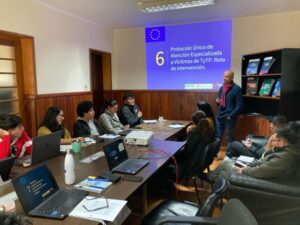-
30 July 2025
Category : Reportage
Human trafficking: a victim-centred approach
Every year, on 30 July, World Day Against Trafficking in Persons is commemorated to raise awareness of the situation of victims of human trafficking and to promote and protect their rights.

Human trafficking is a serious crime that affects millions of people around the world, and this day seeks to mobilise efforts to prevent it, protect victims and prosecute those responsible. Furthermore, in a context of armed conflict and migration flows, it is particularly important to prioritise the protection of victims of trafficking.
A philosophical analysis of public policy design from a humanistic perspective leads us to commit to adapting these policies to people’s needs, for the common good, and where an educated and trained society is essential for governing with justice. In designing public policies aimed at combating human trafficking, it is essential to understand the political dynamics, i.e., to know the decision-making processes, the key actors involved and the factors that influence implementation. This knowledge is necessary in order to apply what is known as a victim-centred approach.
The victim-centred approach, also known as the victim-focused approach, prioritises the needs and concerns of victims, placing them at the centre of attention and processes. The main objective is for victims to regain control over their lives and for the services offered to them to be empathetic and free of prejudice, avoiding processes of revictimisation.
This approach seeks to empower victims, strengthen their resilience and therefore their ability to adapt, and help them recover their family and personal spaces.
In order for this approach to be applied in all key processes in the fight against human trafficking (prevention, protection and criminal prosecution), it is important that all actors in contact with victims have a better understanding of their experience. This better understanding comes from ongoing training aimed at improving knowledge of the problems faced by victims and their specific needs, thereby generating greater awareness and empathy among public servants.
In addition to this specialised training, it is necessary to eliminate elements of revictimisation from the processes, especially during the criminal investigation of the crime, where, for example, victims are forced to repeatedly repeat interviews in which they are forced to repeat and relive the moments of exploitation they have experienced. Victims are a very important source of intelligence, as they have access to information that is highly relevant to the criminal investigation process. However, respect and non-revictimisation cannot be subordinated to the extraction of information. For this reason, it is essential that comprehensive care and protection services are provided as soon as a victim is identified.
Through its project in Bolivia, FIAP works in coordination with the institutions that make up the Plurinational
 Council for the Fight Against Human Trafficking and Smuggling, supporting and strengthening the powers that each institution has under Comprehensive Law 263 on the fight against human trafficking and smuggling.
Council for the Fight Against Human Trafficking and Smuggling, supporting and strengthening the powers that each institution has under Comprehensive Law 263 on the fight against human trafficking and smuggling.To reinforce the application of the victim-centred approach, we have collaborated with both the Ministry of Justice and Institutional Transparency and the Public Prosecutor’s Office in the design and dissemination of the Single Protocol for Specialised Care for Victims of Trafficking and Intervention Route. This Protocol is a set of guidelines and procedures that establish how institutions should act to provide comprehensive care and protection to victims of human trafficking, guaranteeing respect for their rights and promoting their recovery and social reintegration, i.e., the application of the victim-centred approach.
In addition, the design of a diploma course on the prevention and protection of victims of human trafficking has just been completed, which substantially improves the specialised training offered to Bolivian public officials on this crime and on the application of a victim-centred approach.
Santiago Santos
Project Director, Fight Against Human Trafficking, Smuggling of Migrants and Related Offences in Bolivia
The views and opinions expressed in this blog are the sole responsibility of the person who write them.






